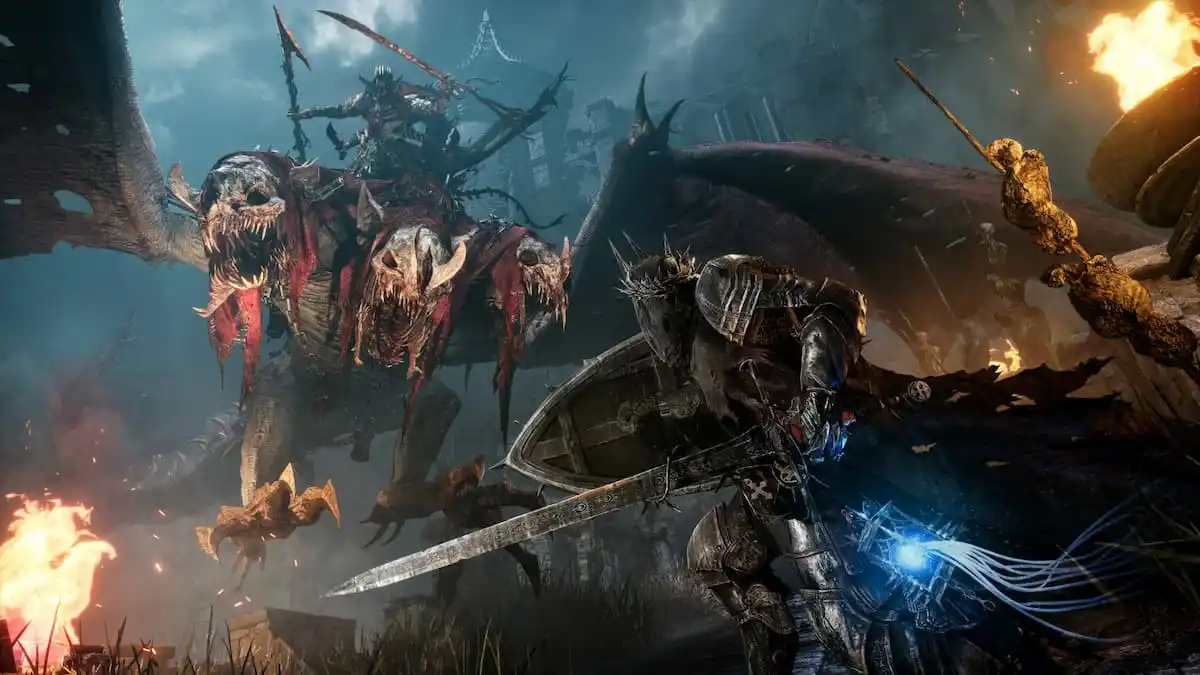Lords of the Fallen on PC
Trying to stand out in a genre as saturated as Soulslikes is far more challenging than any Dark Souls boss. Do you attempt to emulate the best in the business? Or do you try to innovate on the tried-and-tested formula? Both design philosophies can potentially bring you to a conclusion worth playing. But really, the key is in managing to reach a healthy equilibrium of both.
With Hexworks’ much-anticipated reboot, I’m pleased to report that the Barcelona/Bucharest-based studio has succeeded in reaching a fine balance between innovation and replication. Yes, not only has 2023’s Lords of the Fallen surpassed its 2014 predecessor with flying colours, but they’ve also done what many others have failed to do: they’ve come within close quarters of the warmth and glow of the original source material’s glimmering bonfire. Praise the sun, indeed!
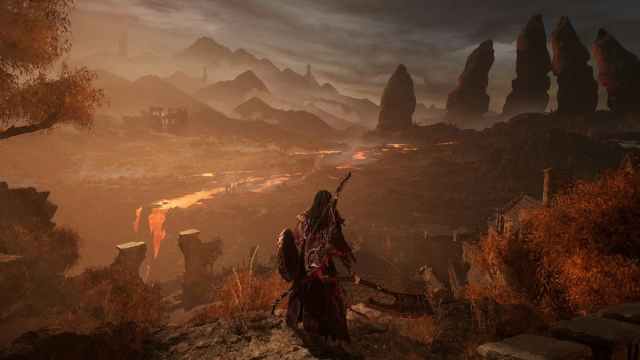
Set a millennia after the events of the original title, the evil deity known as Adyr has made his nefarious return from the land of the dead, known as the Umbral. Hellbent on wreaking havoc on the land of the living, Adyr unleashes war, greed, hatred, and pestilence upon the kingdom. As the Lampbearer, you must traverse through both worlds — the undead Umbral and the living world of Axiom — in a bid to slay the demon god and put him six feet under for good.
Familiarly, the overarching history and lore is drip-fed nicely through cutscenes, item descriptions, and brief dialogue sequences between NPCs and bosses. While the game’s emphasis is not too laser-focused on the actual story, the decaying world of Axiom does feel rich and lived-in, especially compared to its more sterile 2014 forebear. Crumbling spires ascend into the gloomy heavens, mountainous vistas crest the thunder-blasted horizons, and autumnal forests as far as the eye can see evoke fantasy literature akin to J. R. R. Tolkien or George R. R. Martin.
Speaking of visuals, let’s get this out of the way first and foremost: Lords of the Fallen is a very good-looking game. Built on Unreal Engine 5, this is a true next-gen soulslike, and it absolutely looks the part, with moody lighting, sharp shadow effects, and slick performance.
Additionally, textures and environments are richly detailed with pockmarks of erosion in the medieval architecture’s brickwork, charred gnarls of oak and birch reaching out from beneath the earth, and the glimmering pitter patter of rain as it glides off your rugged armor.
That said, it’s not solely a visual spectacle, as it also has the gameplay chops to back up its visual presentation. Indeed, Lords of the Fallen’s core combat is a fluid and flexible system that cribs directly from the studio that first established the popular sub-genre. On the whole, the game’s combat emphasizes a combination of rapid fast attacks that can interrupt enemy assaults and slow, methodically charged swings that deliver larger volumes of damage.
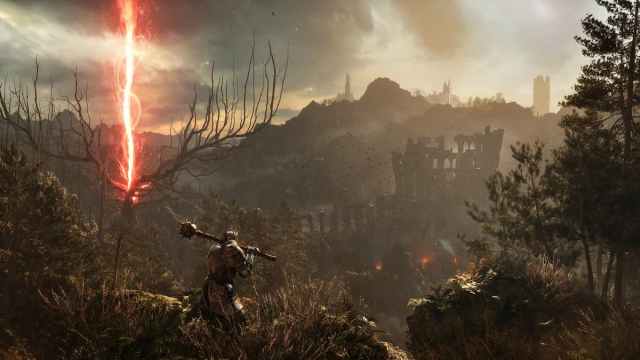
On top of this, blocking with your weapon or shield is incredibly important, as it not only helps to mitigate harm but also transforms incoming injuries into Wither damage. This appears as grey HP on your health bar as opposed to red, and gives players the opportunity to leech back health as you dole out damage to your adversaries.
Thing is, if you’re struck by an enemy, then you’ll lose health and your grey Wither damage in one nasty strike, which can be devastating. So, it pays to keep your shield up, which very much fits in with the whole risk-and-reward theme that these types of game are so deeply rooted in.
Of course, as is par for the course in a Soulslike like this, it’s almost identical to its inspiration mechanically. Instead of bonfires, Vestiges serve as your checkpoints, and here, you’ll be able to upgrade your stats by accruing Souls Vitality. Early on in your adventure, you’ll soon stumble upon a hub location known as Skyrest, replete with oddball traders, mysterious NPCs, and even a blacksmith; though you’ll need to jump through some hoops to unlock him.
Furthermore, fast travel is available from the off, enabling players to hop to another Vestige in a heartbeat.
Now, onto how the experience innovates on From Software’s signature blueprint. Most importantly, Lords of the Fallen features dual dimensions, and thanks to the Umbral Lamp which is gifted to you during the opening, you’re able to use the lantern as a bridge between worlds. Holding up the lamp gives players the chance to see into the Umbral world, and it’s by way of this specific mechanic where some of the game’s most clever ideas come to fruition.
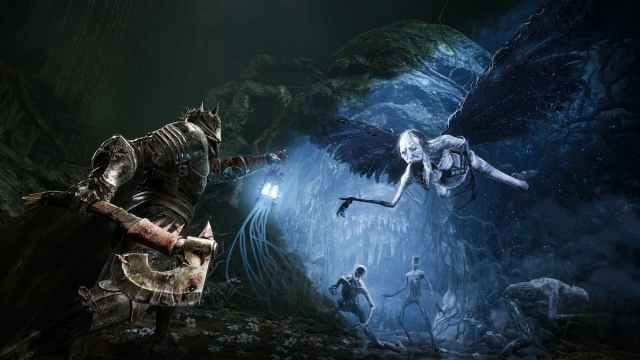
Many of the environmental puzzles at the heart of the game revolve around this dual dimension mechanic. For instance, a locked gate in the land of the living may block your path. However, if you illuminate the gate with your lamp, it may not exist in the Umbral, allowing you to walk straight through without issue.
While you can hold up your lamp and see into the undead world, there are times where you’ll need to fully enter the Umbral in order to get from A to B. Some of these puzzles get pretty creative and the alternate dimension gameplay definitely feels like less of a gimmick and more of a genuinely neat idea, which is laudable.
Likewise, another good idea that Hexworks has brought to the table is much akin to 2020’s Mortal Shell, and this gives players an extra lease of life when they’ve been slain. Instead of dying following a fatal blow, you’ll be thrown into the Umbral realm, which essentially gives players a second chance.
In the Umbral, however, spectres and eldritch horrors will begin to spawn, though you will receive a bonus multiplier for the Vitality that you earn. Fundamentally, this introduces a method of accruing Vitality rapidly, giving players the opportunity of leveling up at a quicker clip than they usually would in Axiom. This introduces some neat emergent and dynamic gameplay where you’ll be able to grind much faster than normal.
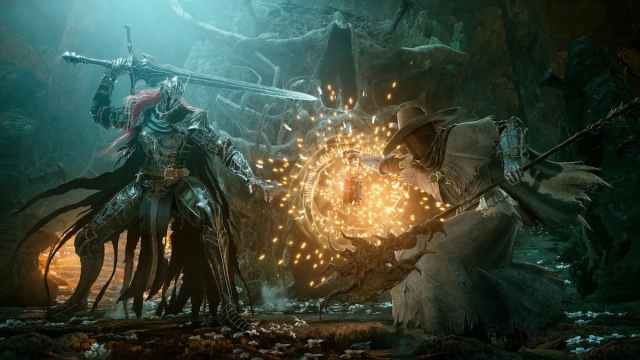
Interestingly, these innovative mechanics do occasionally coalesce in surprising ways. Basically, there was a moment early on during my playthrough where I came upon a river. As I waded into the water, it suddenly became too deep and I tumbled in and died. However, to my astonishment, I wasn’t booted back to the last checkpoint, but instead I entered the Umbral world and the river which I died in did not exist there. In other words, dying in the river gave way to a brand new route that I hadn’t explored before. Pretty cool, right?
Further still, Lords of the Fallen has a couple of other nifty tricks up its blood-drenched sleeve. Firstly, you’ll be able to spawn your very own temporary checkpoint by burying Vestige Seeds in special flowerbeds that are dotted around the world. As the currency is so rare, however, you’ll have to be mindful about where you plant them.
Secondly, Soul Flaying allows players to rip the souls out of foes using their Umbral Lamp, and this gives you a short window to deal powerful Wither damage to an enemy. You only have a limited number of charges, but you can upgrade your lamp as you get further into the game, gifting you more charges to make use of. Once you get accustomed to ripping the souls out of your foes, you’ll begin dragging their souls over the edges of cliffs in an effort to insta-kill more challenging opponents.
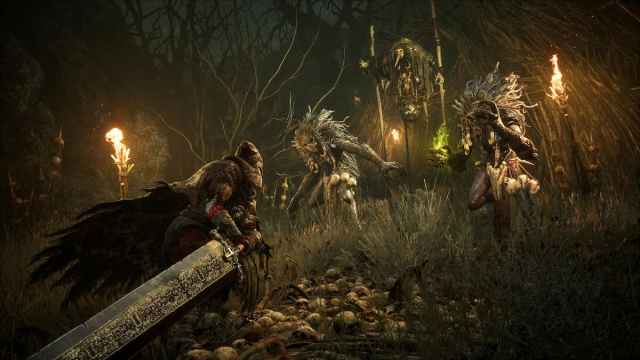
Before I round things out, I do want to touch on some of the more vexing elements that rear their ugly head in Lords of the Fallen. Once in a while, the camera may prove finicky, especially when you’re in close proximity to a wall, and this can sometimes obstruct your viewpoint.
On occasion, enemies which have been provoked and even your own character may get caught on the geometry of the environment, which can be quite immersion-breaking. And the level design in the latter half of the game does lack the meticulous eye of From Software, leading to segments that feel like you’re lost in a maze.
Nevertheless, these moments are hardly game-breaking, and are more trivial annoyances than bone-crushing blunders.
In all though, this is such a comprehensive replica of the Souls formula that a brief glance at the screen will result in most folks thinking that you’re playing a From Software game. Indeed, for the most part, 2023’s Lords of the Fallen is a very well-crafted Soulslike that looks phenomenal, plays really well, and has a deep reverence for the source material it’s inspired by.
And that’s before mentioning how the game brings some genuinely creative ideas to the table that cohesively fit the tone and theme of the entire experience. Sure, it may feel like the shadow of a much hotter and brighter bonfire, but the embers of something truly special burn here.
Pros
Cons
A few occasional rough edges.
